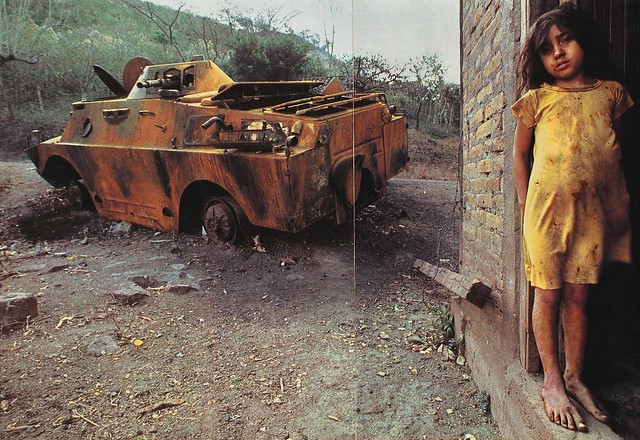10 Facts About Failed States
 A country is considered a ‘failed state’ when it cannot control its territory and population as well as when fails to secure its borders. A failed state has barely functioning executive, legislative and judicial institutions, which in turn, breeds corruption since the honest economic activity is not rewarded by the state. Here are 10 facts about failed states.
A country is considered a ‘failed state’ when it cannot control its territory and population as well as when fails to secure its borders. A failed state has barely functioning executive, legislative and judicial institutions, which in turn, breeds corruption since the honest economic activity is not rewarded by the state. Here are 10 facts about failed states.
10 Facts About Failed States
-
Throughout history, civil wars, ethnic cleansing and human rights violations have led to states losing the capacity to regulate and control themselves. When a state loses the capacity to implement policies throughout the country, when it cannot establish public order and equity, and when the government cannot assure the independence of institutions, instability and insecurity reign.
-
North Korea is often called the ‘hermit kingdom’ due to its isolated nature. The country frequently receives low scores on its legitimacy of state. Aid organizations estimate that around 2 million people have died from food shortages since the mid-1990s. Part of this can be traced back to the economic institutions that prohibit people from owning property as the state collectively owns most land and capital.
-
Another sign of a faile state is forced labor. In Uzbekistan, students are forced to pick cotton, one of Uzbekistan’s biggest exports. In September, while teachers are relegated to the role of labor recruiters. The children are given quotas of between 20 and 60 kilograms, which varies according to their age. Thus, the children are unable to break out of the cycle of poverty due to their lack of learning.
-
Syria can be considered a failed state as it is experiencing a civil war that has claimed 100,000 lives and has no end in sight. The country receives an extremely low score for security apparatus, according to Foreign Policy magazine’s annual metric data.
-
Egypt’s elite is monopolizing the economy to block the entry of new competitors. Under Hosni Mubarak, the military and government own large portions of the economy. According to some estimates, they collectively own up to 40 percent. Even after liberalization, the economy was privatized into the hands of Mubarak’s friends and sons’ companies. Big businesses put a stranglehold on the economy while Mubarak’s family accumulated an estimated $70 billion fortune.
-
In most failed states, it is typical for the regime and its leaders to prey on its constituents. The regime tends to be motivated by ethnic or intercommunal hostility or even the insecurities of the elite, which lead to the victimization of their citizens or a subset demographic which is deemed ‘hostile.’ This is the case in Mobutu Seke Soso’s Zaire, where the ruling elite oppress and extort the majority of citizens while expressing preferential treatment for a specific sect or clan.
-
Failed states can often be identified by weak infrastructure. As the rulers or ruling class becomes more and more corrupt, there are often fewer capital resources available for road crews, equipment and raw materials. For example, in the Democratic Republic of Congo, refurbishing navigational aids along aerial waterways was not prioritized.
-
In order to have a successful economy, a country must have a strong, centralized nation-state. Without this, it becomes exceedingly difficult to provide law and order as mechanisms to solve disputes and provide basic public goods. Somalia exemplifies this failure to exercise control over territories beyond its capital. This can be attributed to the traditional social structure in Somalia where clans made decisions according to the adult males as opposed to adhering to a central authority figure. This persisted in the colonial era and into the modern day with Mohammed Siad Barre’s dictatorship failing to change it.
-
An economy based on extreme extraction breeds political instability as it incentivizes the non-elites to depose the ruling class and take over. In Sierra Leone, Siaka Stevens and his All People’s Congress (APC) party ran the country from 1967 to 1985 as a dictatorship until he handed control to his protege Joseph Momoh. This invited would-be strongmen such as Foday Sankoh to plunge the country into a vicious civil war in 1991. He was only interested in power in order to steal diamonds. The government revenue went from 15 percent of national income to essentially zero in 1991.
-
Corruption flourishes on a governmental, nationwide level. Examples include benefitting from anything that can be put to fake tender (medical supplies, bridges, roads, textbooks), wasteful construction projects and licenses for non-existent activities. The corrupt ruling elites mostly invest their ill-gotten money overseas, which worsens the economic situation domestically. Military officers too are guilty of profiting off these corrupt regimes.
In an earlier era where the world was less connected and globalized, it might have been possible to isolate the effects of a failed state from the others. However, in the connected state of today’s global economy and political system, the failures of one state poses grave threats to the security of others. These 10 facts about failed states shed a little more light on sign to look out for when identifying states that have failed or are going in that direction.
Photo: Flickr
